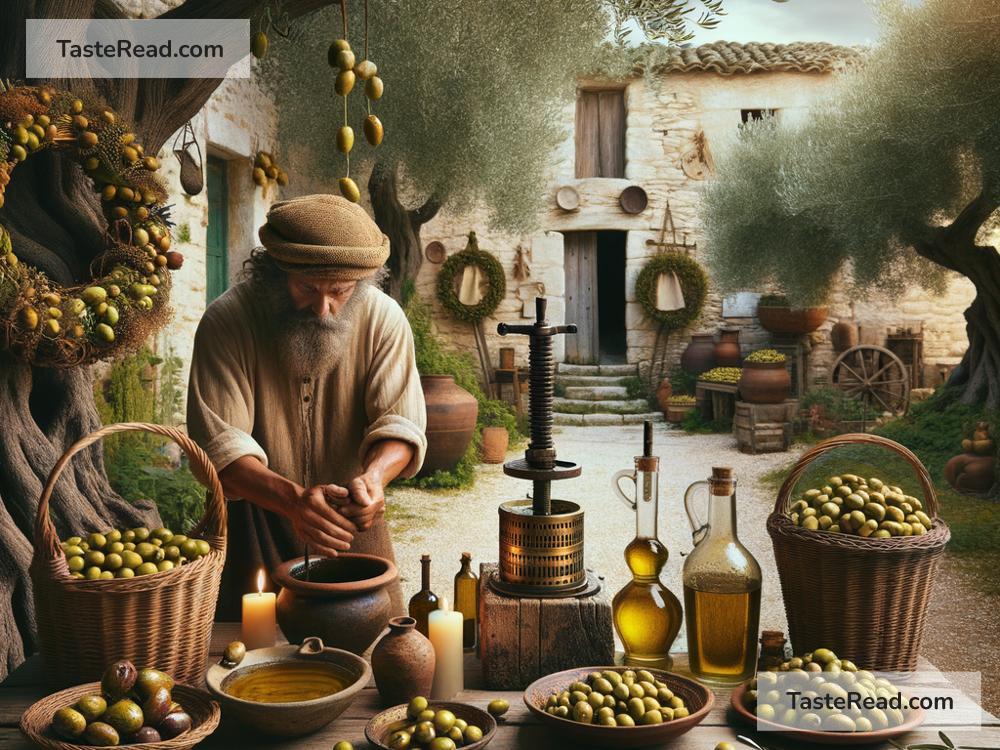The Ancient Rituals Surrounding Olives and Olive Oil
For thousands of years, olives and olive oil have been much more than food or cooking ingredients. These humble fruits and their golden oil have been deeply tied to history, culture, and spirituality. Ancient societies saw olives and olive oil not just as resources, but as symbols of life, health, prosperity, and connection to the divine. This blog explores the fascinating rituals surrounding olives and olive oil in ancient times.
The Olive Tree: A Gift from the Gods
In many ancient cultures, the olive tree was regarded as sacred. The tree’s resilience and ability to thrive in harsh, rocky soil inspired awe, and its fruit seemed like a gift from the heavens. For the ancient Greeks, olive trees were believed to be a divine creation from the goddess Athena. According to legend, Athena gifted the olive tree to humanity during a contest with Poseidon to see who could give the most valuable gift to the city of Athens. The olive tree won, and Athens was named after her. This story highlights how deeply intertwined olives were with Greek identity and spiritual beliefs.
The Greeks planted olive trees around temples and sacred spaces, believing they symbolized wisdom, peace, and protection. It was forbidden to cut down these trees because of their sacred status. Similarly, the Romans revered the olive tree, associating it with the goddess Minerva (the Roman equivalent of Athena). Olive branches became symbols of victory and used to crown champions and military generals. Even today, olive branches signify peace worldwide.
Olive Oil as “Liquid Gold”
Ancient societies did not view olive oil as an ordinary substance. To them, it was precious and magical—a miracle squeezed from the fruit of the sacred olive tree. From Mesopotamia to Greece, olive oil became a source of light, nourishment, and ritual.
1. Holy Oil for Ceremonial Use
Olive oil was essential in religious rituals across various cultures. In Ancient Egypt, priests used olive oil mixed with perfumes to anoint statues of gods, making the figures “alive” for worship. In Jewish traditions, olive oil was considered pure and sacred. It was used to light the menorah in the temple, and special olive oils were prepared for blessings and anointing kings.
The use of olive oil for anointing wasn’t limited to religion. Kings, warriors, and leaders in Mesopotamia, Greece, and Rome were often anointed with olive oil as part of ceremonial practices. Anointing symbolized divine favor, strength, and protection.
2. Lighting the Way
Before electricity was even imagined, olive oil was a primary source of light. Ancient lamps relied on this golden liquid to produce clean and long-lasting flames. In Greek temples, olive oil lamps illuminated sacred spaces dedicated to deities, while in homes, they provided gentle light for evening gatherings or prayers. The act of lighting an olive oil lamp was considered a connection to the divine—the glowing flame represented enlightenment, purity, and protection.
Rituals of Healing with Olive Oil
Olive oil wasn’t just a spiritual component; it was also a healing agent. Ancient Egyptians, Greeks, and Romans believed it had therapeutic powers. Its soothing, moisturizing, and anti-inflammatory properties made it an essential tool for medicine and beauty.
In Ancient Egypt, olive oil was a core ingredient in balms used to treat wounds and skin irritations. It was also mixed with herbs to create remedies for aches and other physical ailments. The Greek physician Hippocrates, often called the “Father of Medicine,” documented over 60 medical uses for olive oil, ranging from treating ulcers to reducing fevers.
Healing rituals often included olive oil. In some cases, priests or healers would rub olive oil on the sick while chanting prayers, believing that the oil carried divine power to restore health and vitality. Olive oil baths were considered rejuvenating and used by both the wealthy and spiritually inclined people as a form of purification.
Community Rituals: Olive Harvests and Festivals
The harvest of olives was more than just work; it was a joyful moment celebrated with rituals and festivals. In ancient Greece, olive harvests were seen as a time of gratitude to Athena and other deities for blessing the land. Families and communities came together to pick olives, sharing stories and food while working side by side.
After the olives were collected, they were taken to be pressed into oil, which was considered almost a sacred act. The first batch of olive oil was often offered to the gods as a token of thankfulness. Festivals related to olives and olive oil included feasts, music, and dances, emphasizing the significance of the olive tree as a life-giving force.
A Legacy of Sacred Traditions
The rituals surrounding olives and olive oil in ancient times reveal how much people valued this extraordinary gift from nature. They saw it as a bridge between the earthly and the divine, a symbol of peace, light, healing, and abundance. While modern societies now use olive oil primarily for cooking, its enduring legacy persists in spiritual symbolism, medicine, and cultural practices.
The next time you drizzle olive oil over your salad or dip bread into it, remember the rich traditions surrounding this “liquid gold.” What seems simple today once held profound meaning for those who came before us. Through olives and olive oil, we can connect with ancient wisdom and celebrate nature’s blessings just as our ancestors did centuries ago.


